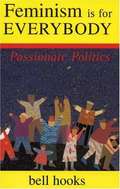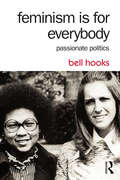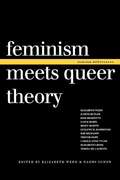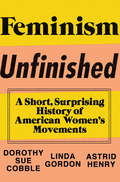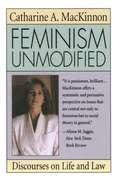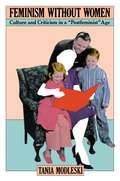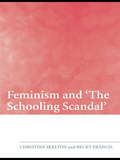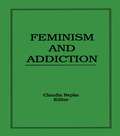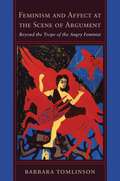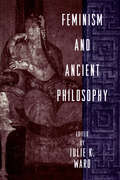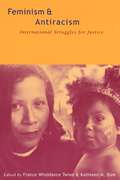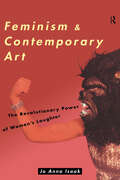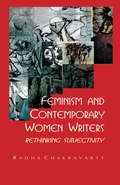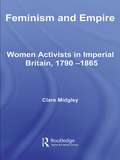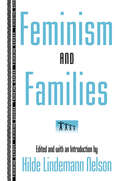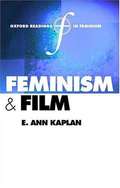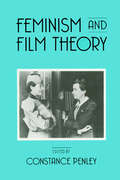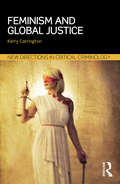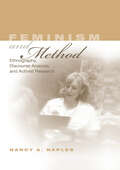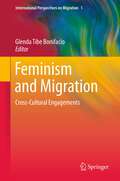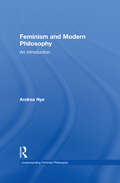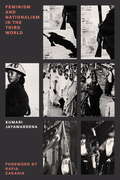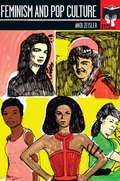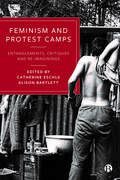- Table View
- List View
Feminism Is for Everybody: Passionate Politics
by Bell HooksHooks is a vision of a beloved community that appeals to all those committed to equality, mutual respect, and justice. Hooks applies her critical analysis to the most contentious and challenging issues facing feminists today, including reproductive rights, violence, race, class, and work. With her customary insight and unsparing honesty, Hooks calls for a feminism free from divisive barriers but rich with rigorous debate. In language both eye-opening and optimistic, Hooks encourages us to demand alternatives to patriarchal, racist, and homophobic culture, and to imagine a different future. Hooks speaks to all those in search of true liberation, asking readers to take look at feminism in a new light, to see that it touches all lives. Issuing an invitation to participate fully in feminist movement and to benefit fully from it, Hook's shows that feminism -- far from being an outdated concept or one limited to an intellectual elite -- is indeed for everybody.
Feminism Is for Everybody: Passionate Politics (Second Edition)
by Bell HooksWhat is feminism? In this short, accessible primer, bell hooks explores the nature of feminism and its positive promise to eliminate sexism, sexist exploitation, and oppression. With her characteristic clarity and directness, hooks encourages readers to see how feminism can touch and change their lives--to see that feminism is for everybody.
Feminism Meets Queer Theory
by Elizabeth Weed Naomi Schor"... innovative and important thinking about the various relations between feminist theory, queer theory, and lesbian theory, as well as the possibility that liberation can be mutual rather than mutually exclusive. " -- Lambda Book Report. When feminism meets queer theory, no introductions seem necessary. The two share common political interests -- a concern for women's and gay and lesbian rights -- and many of the same academic and intellectual roots. And yet, they can also seem like strangers, needing mediation, translation, clarification. This volume focuses on the encounters of feminist and queer theories, on the ways in which basic terms such as "male" and "female," "man" and "woman," "black," "white," "sex," "gender," and "sexuality" change meaning as they move from one body of theory to another. Along with essays by Judith Butler, Evelynn Hammonds, Biddy Martin, Kim Michasiw, Carole-Anne Tyler, and Elizabeth Weed, there are interviews: Judith Butler engages Rosi Braidotti and Gayle Rubin in separate revealing discussions. And there are critical exchanges: Rosi Braidotti and Trevor Hope exchange comments on his reading of her work; and Teresa de Lauretis responds to Elizabeth Grosz's review of her recent book.
Feminism Unfinished: A Short, Surprising History of American Women's Movements
by Dorothy Sue Cobble Linda Gordon Astrid HenryReframing feminism for the twenty-first century, this bold and essential history stands up against "bland corporate manifestos" (Sarah Leonard). <P><P> Eschewing the conventional wisdom that places the origins of the American women's movement in the nostalgic glow of the late 1960s, Feminism Unfinished traces the beginnings of this seminal American social movement to the 1920s, in the process creating an expanded, historical narrative that dramatically rewrites a century of American women's history. Also challenging the contemporary "lean-in," trickle-down feminist philosophy and asserting that women's histories all too often depoliticize politics, labor issues, and divergent economic circumstances, Dorothy Sue Cobble, Linda Gordon, and Astrid Henry demonstrate that the post-Suffrage women's movement focused on exploitation of women in the workplace as well as on inherent sexual rights. The authors carefully revise our "wave" vision of feminism, which previously suggested that there were clear breaks and sharp divisions within these media-driven "waves." Showing how history books have obscured the notable activism by working-class and minority women in the past, Feminism Unfinished provides a much-needed corrective.
Feminism Unmodified: Discourses On Life And Law
by Catharine MacKinnonCatharine A. MacKinnon, noted feminist and legal scholar, explores and develops her original theories and practical proposals on sexual politics and law. These discourses, originally delivered as speeches, have been brilliantly woven into a book that retains all the spontaneity and accessibility of a live presentation. MacKinnon offers a unique retrospective on the law of sexual harassment, which she designed and has worked for a decade to establish, and a prospectus on the law of pornography, which she proposes to change in the next ten years. Authentic in voice, sweeping in scope, startling in clarity, urgent, never compromised and often visionary, these discourses advance a new theory of sex inequality and imagine new possibilities for social change. Through these engaged works on issues such as rape, abortion, athletics, sexual harassment, and pornography, MacKinnon seeks feminism on its own terms, unconstrained by the limits of prior traditions. She argues that viewing gender as a matter of sameness and difference--as virtually all existing theory and law have done--covers up the reality of gender, which is a system of social hierarchy, an imposed inequality of power. She reveals a political system of male dominance and female subordination that sexualizes power for men and powerlessness for women. She analyzes the failure of organized feminism, particularly legal feminism, to alter this condition, exposing the way male supremacy gives women a survival stake in the system that destroys them.
Feminism Without Women: Culture and Criticism in a "Postfeminist" Age
by Tania ModleskiIn a series of essays scrutinizing feminist and post-structuralists positions, Tania Modleski examines "the myth of postfeminism" and its operation in popular culture, especially popular film and cultural studies. (First published in 1991.)
Feminism against Progress
by Mary HarringtonModern feminism increasingly benefits only a small class of professional women. There is no reason to sacrifice everyone else's happiness for their sake.Mary Harrington shows that women's liberation was less the result of moral progress than an effect of the material consequences of the Industrial Revolution. We've now left the industrial era for the digital age, in which technology is liberating us from natural limits and embodied sex differences. This shift may benefit the elites, but it also makes it easier to commodify women's bodies, human intimacy, and female reproductive abilities. "Feminism" has been captured by well-off white-collar women, who use it to advance their own economic and political interests under the pretense that these are the interests of all women—all the while wielding the term like a club against anyone, male or female, who dissents. Feminism against Progress is a stark warning against a dystopian future in which poor women become little more than convenient sources of body parts to be harvested and wombs to be rented by the rich. "Progress" no longer benefits the majority of women, and only a feminism that is skeptical of it can truly defend their interests in the twenty-first century.
Feminism and 'The Schooling Scandal'
by Christine Skelton Becky FrancisFeminism and ‘The Schooling Scandal’ brings together feminist contributions from two generations of educational researchers, evaluating and celebrating the field of gender and education. The focus throughout is on the years of compulsory schooling, examining key concepts in gender and education identified and developed by international thinkers in educational feminism. Topics covered include: social class, ethnicity and sexuality in relation to experiences in school; theories and methodologies for understanding gender; pedagogy and practice in education; and the direction of educational policy and the ‘problem of boys’. Providing a comprehensive overview of contemporary research and theory emerging from ‘second wave’ feminism and assessing their impact on pupils and teachers in today’s schools and classrooms, this book forms essential reading for anyone studying gender and education.
Feminism and Addiction
by Claudia BepkoFeminism is a beneficial force in addictions therapy as they have the same goals--mending imbalances of power. A variety of important topics related to addictions treatment are addressed in this timely volume, accompanied by concrete clinical solutions for therapists and counselors to use in their own practice. Feminism and Addiction demonstrates the positive impact feminism can have on addictions treatment. Addictions treatment methods that have been developed primarily based on research with men are examined and questioned to determine what changes need to be made to meet the needs of women. The applicability of twelve-step treatment programs, for example, is investigated as to whether its required adoption of belief in powerlessness is concurrent with feminism’s battle with female subjugation. This thought-provoking volume contains the most current theoretical, social, and clinical issues enmeshed in the debates between men’s experiences and women’s experiences of addiction. Critical issues addressed include advice for how to deal with issues of codependency; how to treat clients faced with physical or sexual abuse in addition to addiction; how to integrate cultural differences into treatment; and how to face the particular difficulties of gay and lesbian clients in addictions treatment. This valuable book will help you apply constructivist approaches to build therapy methods which are collaborative, internal, and organic, thus more appropriate to treating women’s experience with addiction. Feminism and Addiction helps family therapists who work with women and their families strike a unique balance between the principles of feminism and family therapy’s goal of repairing and healing relationships between men and women.
Feminism and Affect at the Scene of Argument: Beyond the Trope of the Angry Feminist
by Barbara TomlinsonAre feminists really angry, unreasoning, man-haters who argue only from an emotional perspective as some claim? Does the incessant repetition of this trope make anti-feminism and misogyny a routine element in everyday speech? And does this repetition work towards delegitimizing feminist arguments and/or undermining feminist politics? How do skilled feminist writers deploy affect to advance feminist ideas? InFeminismand Affect at the Scene of Argument,Barbara Tomlinson addresses these questions, providing a lucid examination of the role of affect in feminist and antifeminist academic arguments. Using case studies from controversies in socio-legal studies, musicology, and science studies, among other disciplines, Tomlinson examines the rhetorics of anger, contempt, betrayal, intensification, and ridicule. She employs a set of critical tools—feminist “socio-forensic” discursive analysis—that will prove indispensible for understanding and countering tropes like that of the angry feminist. Moreover, these tools will advance feminism, which, she argues, is generated in and by arguments with allies and antagonists.
Feminism and Ancient Philosophy
by Julie K. WardAn important volume connecting classical studies with feminism, Feminism and Ancient Philosophy provides an even-handed assessment of the ancient philosophers' discussions of women and explains which ancient views can be fruitful for feminist theorizing today. The papers in this anthology range from classical Greek philosophy through the Hellenistic period, with the predominance of essays focusing on topics such as the relation of reason and the emotions, the nature of emotions and desire, and related issues in moral psychology. The volume contains some new, ground-breaking essays on Plato, Aristotle, and the Stoics, as well as previously published pieces by established scholars like Martha Nussbaum and Julia Annas. It promises to be of interest to an interdisciplinary audience including those working in classics, ancient philosophy, and feminist theory.
Feminism and Antiracism: International Struggles for Justice
by France Winddance Twine and Kathleen M. BleeA collection of international scholars and activists answer the questionshow does gender and region/nation play a defining role in how feminists engage in anti-racist practices? How has the restructuring in the world economy affected anti-racist organizing? How do Third World Feminists counter the perception that feminism is a "Western" ideology and how effective are their methods? What opportunities does globalization bring for cross-cultural organizing? From essays on the race and gender issues in organizing exotic dancers to resistance art in Africa and the U.S., this timely and necessary anthology will be sure to spark debate and controversy. Contributors: Angela Davis, Kathleen Blee, France Winddance Twine, Heater Merrill, Veronica Magar, Siobhan Brooks, Delores Walters, Michelle Rosenthal, Ellen Kaye Scott, andrea breen, Yoshiko Nozaki, Sohera Syeda, Becky Thompson, Paola Bacchetta, Carolyn Martin Shaw, Eileen O'Brien and Michael Armato, Jane Freedman, Cathleen Armstead, Ashwini Deshpande, and Minelle Mahtani.
Feminism and Contemporary Art: The Revolutionary Power of Women's Laughter
by Jo Anna IsaakFirst published in 2002. Routledge is an imprint of Taylor & Francis, an informa company.
Feminism and Contemporary Women Writers: Rethinking Subjectivity
by Radha ChakravartyThis book attempts to deal with the problem of literary subjectivity in theory and practice. The works of six contemporary women writers — Doris Lessing, Anita Desai, Mahasweta Devi, Buchi Emecheta, Margaret Atwood and Toni Morrison — are discussed as potential ways of testing and expanding the theoretical debate. A brief history of subjectivity and subject formation is reviewed in the light of the works of thinkers such as Hobbes, Hume, Kant, Hegel, Marx, Nietzsche, Raymond Williams and Stephen Greenblatt, and the work of leading feminists is also seen contributing to the debate substantially.
Feminism and Empire: Women Activists in Imperial Britain, 1790–1865
by Clare MidgleyFeminism and Empire establishes the foundational impact that Britain's position as leading imperial power had on the origins of modern western feminism. Based on extensive new research, this study exposes the intimate links between debates on the 'woman question' and the constitution of 'colonial discourse' in order to highlight the centrality of empire to white middle-class women's activism in Britain. The book begins by exploring the relationship between the construction of new knowledge about colonised others and the framing of debates on the 'woman question' among advocates of women's rights and their evangelical opponents. Moving on to examine white middle-class women's activism on imperial issues in Britain, topics include the anti-slavery boycott of Caribbean sugar, the campaign against widow-burning in colonial India, and women’s role in the foreign missionary movement prior to direct employment by the major missionary societies. Finally, Clare Midgley highlights how the organised feminist movement which emerged in the late 1850s linked promotion of female emigration to Britain's white settler colonies to a new ideal of independent English womanhood. This original work throws fascinating new light on the roots of later 'imperial feminism' and contemporary debates concerning women's rights in an era of globalisation and neo-imperialism.
Feminism and Families (Thinking Gender)
by Hilde Lindemann NelsonA ground-breaking volume of all new essays covering the conjunction of two topics--feminism and families--that, for all their centrality in our culture, have not been adequately examined in light of one another. While the family has suffered feminist neglect, most women are in fact members of families, living their lives within the social context of families, even at a time when the concept of "family" has become bewilderingly unstable. The intersection of families and feminism is thus one in need of philosophical reflection, as a basis both for good public policy and for the ethical relationships of intimate life.
Feminism and Film (Oxford Readings in Feminism Series)
by E. Ann KaplanThis book brings together carefully selected essays on feminism and film with a view to tracing major developments in theory, criticism, and practices of women and cinema from 1973 to the present day. It illuminates the powerful, if controversial, role feminist research has played in the emergence of Film Studies as a discipline during these years; reprinting influential 1970s pioneering essays tracing the ensuing debates and challenges to key theories that shaped this field in the next two decades. Kaplan details the Euro-American contexts within which feminist film theories and practices emerged and traces the changing influences of French, German, and American intellectual movements on feminist film research. As well as a wide-ranging introduction which sets the selection of essays in context, readers will find examples of social-role, psychoanalytic, structuralist, post-structuralist, gay and lesbian, postmodern and postcolonial feminist film criticism, prefaced by introductory notes and including further readings.
Feminism and Film Theory
by Constance PenleyFirst published in 1988. Routledge is an imprint of Taylor & Francis, an informa company.
Feminism and Global Justice (New Directions in Critical Criminology)
by Kerry CarringtonIn this book, Kerry Carrington takes a bold, critical and reflexive approach to understanding the global divisions and inequalities that shape distinctive patterns of gender and crime. The book argues that in order for feminist criminology to enhance its conceptual and political relevance in the twenty-first century, bold new directions in scholarship on gender, crime and global justice are required that also take into account global divisions and inequalities. Issues explored in the book include the forced marriage of child brides, female genital mutilation, feminicide, honour crimes, rape and domestic violence, and the systemic denial of female rights justified by religion, custom or culture. It also explores rising rates of violence recorded for women offenders globally, and their increasing participation in terrorism, as well as troubling male-on-male violence in anomic spaces cultivated by globalising forces. Feminism and Global Justice argues that the world needs feminism more than ever to address systemic culturally shaped and diverse forms of injustice experienced by females across the globe, many of them children. It will be essential reading for international and national human rights organisations, as well as academics and students engaged in the study of criminology, development studies, sociology, politics, and gender studies.
Feminism and Method: Ethnography, Discourse Analysis, and Activist Research
by Nancy A. NaplesNaples draws on different research topics, such as welfare, poverty, sexual identity, and sexual abuse, to illustrate some of the most salient dilemmas of feminist research: the debate over objectivity, the paradox of discourse, the dilemma of "standpoint," and the challenges of activist research. By linking important feminist theoretical debates with case studies, Naples illustrates the strategies she developed for resolving the challenges posed be postmodern, Third World, postcolonial, and queer studies.
Feminism and Migration
by Glenda Tibe BonifacioFeminism and Migration: Cross-Cultural Engagements is a rich, original, and diverse collection on the intersections of feminism and migration in western and non-western contexts. This book explores the question: does migration empower women? Through wide-ranging topics on theorizing feminism in migration, contesting identities and agency, resistance and social justice, and religion for change, well-known and emerging scholars provide in-depth analysis of how social, cultural, political, and economic forces shape new modalities and perspectives among women upon migration. It highlights the centrality of the various meanings and interpretations of feminism(s) in the lives of immigrant and migrant women in Australia, Belgium, Brazil, Eastern Europe, France, Greece, Japan, Italy, Mexico, Morocco, Papua New Guinea, Spain, and the United States. The well-researched chapters explore the ways in which feminism and migration across cultures relate to women's experiences in host societies --- as women, wives, mothers, exiles, nuns, and workers---and the avenues of interactions for change. Cross-cultural engagements point to the convergence and even disjunctures between (im)migrant and non-immigrant women that remain unrecognized in contemporary mainstream discourses on migration and feminism.
Feminism and Modern Philosophy (Understanding Feminist Philosophy)
by Andrea NyeA feminist approach to the history of modern philosophy reveals new insights into the lives and works of major figures such as Jean-Jacques Rousseau and David Hume, and is crucial to an appreciation of the advent of feminist philosophy. Feminism and Modern Philosophy introduces students to the main thinkers and themes of modern philosophy from different feminist perspectives, and highlights the role of gender in studying classic philosophical texts.This book shows how the important figures in the history of modern philosophy have been reinterpreted by feminist theory, including:* feminist critiques of Descartes' rationalism* Locke's 'state of nature' as it relates to the family* the charges of misogyny levelled against KantIn addition, the book introduces lesser-studied texts and interpretations, such as:* the metaphysics of Leibniz's contemporary, Anne Conway* Annette Baier's recent presentation and defence of HumeFeminism and Modern Philosophy: An Introduction is written in an accessible and lively style, and each chapter ends with a helpful annotated guide to further reading. It will be appropriate for philosophy as well as gender studies courses looking at the development of modern western thought.
Feminism and Nationalism in the Third World
by Rafia Zakaria Kumari JayawardenaA founding text of transnational feminismFor twenty-five years, Feminism and Nationalism in the Third World has been an essential primer on the late nineteenth- and early twentieth-century history of women's movements in Asia and the Middle East. In this engaging and well-researched survey, Kumari Jayawardena presents feminism as it originated in the Third World, erupting from the specific struggles of women fighting against colonial power, for education or the vote, for safety, and against poverty and inequality. Journalist and human rights activist Rafia Zakaria's foreword to this new edition is an impassioned letter in two parts: the first to Western feminists; the second to feminists in the Global South, entreating them to use this "compendium of female courage" as a bridge between women of different nations.Feminism and Nationalism in the Third World was chosen as one of the top twenty Feminist Classics of this Wave, 1970-1990, by Ms. magazine, and won the Feminist Fortnight Award in the UK.From the Trade Paperback edition.
Feminism and Pop Culture: Seal Studies (Seal Studies)
by Andi ZeislerWhether or not we like to admit it, pop culture is a lens through which we alternately view and shape the world around us. When it comes to feminism, pop culture aids us in translating feminist philosophies, issues, and concepts into everyday language, making them relevant and relatable. In Feminism and Pop Culture, author and cofounder of Bitch magazine Andi Zeisler traces the impact of feminism on pop culture (and vice versa) from the 1940s to the present and beyond. With a comprehensive overview of the intertwining relationship between women and pop culture, this book is an ideal introduction to discussing feminism and daily life.
Feminism and Protest Camps: Entanglements, Critiques and Re-Imaginings
by Catherine Eschle and Alison BartlettThis groundbreaking collection interrogates protest camps as sites of gendered politics and feminist activism. Drawing on case studies that range from Cold War women-only peace camps to more recent mixed-gender examples from around the world, diverse contributors reflect on the recurrence of gendered, racialised and heteronormative structures in protest camps, and their potency and politics as feminist spaces. While developing an intersectional analysis of the possibilities and limitations of protest camps, this book also tells new and inspiring stories of feminist organising and agency. It will appeal to feminist theorists and activists, as well as to social movement scholars.
